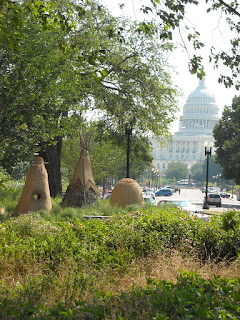
I have been feeling guilty about not getting a huge load of homework done this past weekend. And I've also been trying to balance that guilt with the knowledge that I was out of my routine for some really good and wonderful reasons. It was appropriate for me to take time away from homework to take advantage of these good opportunities that came my way to learn new things and bond with people I admire. And yet the guilt lingers.
Yesterday I came across a quote from Amos Bronson Alcott (famous 19th-century reformer and father of Louisa May): "The less of routine, the more of life." So I am walking around with that sentence in my head, repeating it as a mantra and trying to dispel that lingering guilt, trying to affirm that what I did this past weekend was live life! Life offered me some amazing gifts, and I said yes to them.
Here's some of what I lived (and that gave me joy):
A one-day fiber workshop with Judith Mackenzie...

(Here I am with Judith at the end of the workshop.
Do I look crammed full of good info?
Judith is the most patient teacher I know... plus she's a certified fiber goddess.)
Do I look crammed full of good info?
Judith is the most patient teacher I know... plus she's a certified fiber goddess.)

(Before and after the workshop I finished spinning some of the Bison roving Judith sells. It is so soft and smushy!)
A one-afternoon visit with Tom Weaver...

(We took him hiking at Gallant Woods, one of the Preservation Parks near town. It was a lovely afternoon!)


(We admired the trees and sky...
and I talked to the horses...)
and I talked to the horses...)

(... and we admired the butterflies; this one is a Buckeye, Tom said.
He knows a LOT about our plant, tree, and animal relatives!)
He knows a LOT about our plant, tree, and animal relatives!)
Tom also met briefly with the student team I'm going with to the rez in March of 2011. He taught us a couple Lakota prayer songs, one of which I recognized and had been wanting to learn. It was also good to just hang out with him in our kitchen, cooking some food and talking about families and getting to know each other.
It was a good weekend. Even if I am behind on my paperwork.
Hope you have a chance to experience the more of life soon!
Cheers,
Karen















